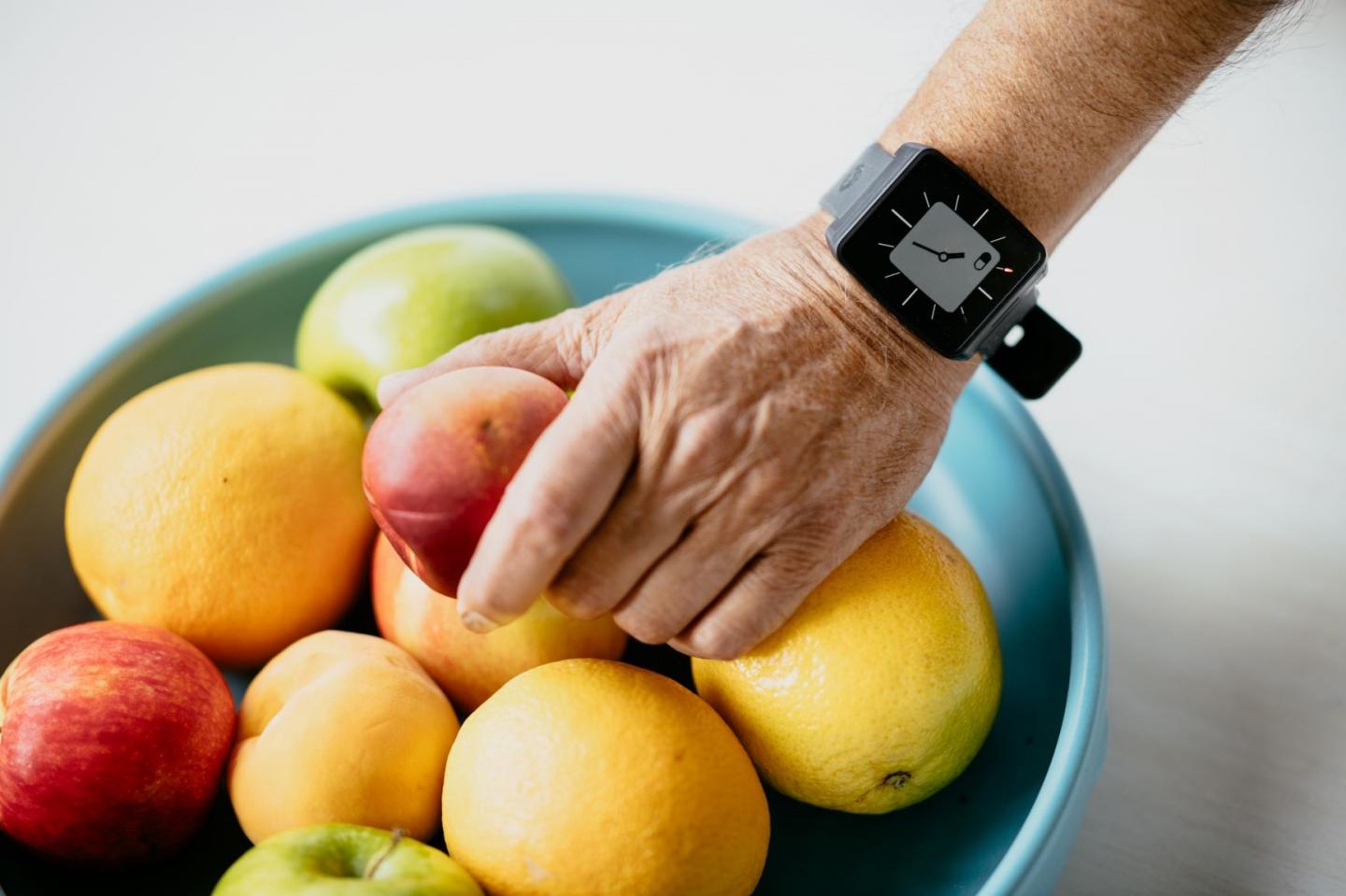People with Parkinson’s could see their care transformed thanks to a new service in the UK involving wearable technology

Credit: Global Kinetics Corporation
People with Parkinson’s could see their care transformed thanks to a new service involving wearable technology.
The project, entitled Developing Home-based Parkinson’s Care and led by the University of Plymouth and University Hospitals Plymouth NHS Trust (UHPNT), will see patients use a wrist-worn device known as a Personal Kinetigraph (PKG®) as part of a new scheme to help them and a specialist team monitor their condition at home.
Developed by the Global Kinetics Corporation, the PKG monitors movement symptoms of Parkinson’s and processes them through a proprietary algorithm. Supplemented by a questionnaire that asks patients to detail non-motor symptoms such as changes in mood, patients will wear the PKG for six-day stints, enabling them and their care team to identify and implement any required changes to therapy.
The specialist Parkinson’s team can then work remotely, ensuring that help – including calls or clinic appointments – can be offered when it is needed.
Current guidelines suggest that people with Parkinson’s should receive specialist review at least every six months, whatever the stage of their condition, usually provided by a consultant and community Parkinson’s disease nurse specialist (PDNS). But a recent audit of patient experience, conducted by the project team, found that 46% have consultant appointments delayed by more than six months, and 60% have not seen the community nurse within the last year. Some regions of the UK don’t have the specialist service, and 50% of vacant PDNS posts are due to long-term sick leave or resignation.
A key part of the project is the design of a new service, which will bring together people with Parkinson’s, their families and healthcare teams in co-design workshops. This will ensure that care delivery really meets the needs and expectations of people living with Parkinson’s.
The service will also deliver an education package, letting people know how to ensure the service works best for them, as well as providing people with the knowledge they need to manage their Parkinson’s symptoms better themselves and ‘live well’ with Parkinson’s.
The project has received £75,000 funding from The Health Foundation and £15,500 from a Parkinson’s UK Excellence Network Service Improvement Grant, and will initially be delivered to 150 patients in Plymouth city, West Devon and East Cornwall, as a pilot. If successful, the team hopes the system could be rolled out across the UK.
Another key element, and a priority for The Health Foundation, is that the service will also work better for healthcare staff; removing some of the frustrations and isolation of working in the current system, and resulting in enhanced wellbeing.
Project lead Dr Camille Carroll, Associate Professor in the University of Plymouth’s Institute of Translational and Stratified Medicine (ITSMed) and Consultant Neurologist at UHPNT, said: “The UK prevalence of Parkinson’s disease will increase by a fifth by 2025, so the challenges associated with providing a timely and patient-centred service will also be much higher.
“The existing service puts a lot of pressure on nurses, and attending clinics is arduous for both patient and carer as it presents logistical and physical challenges that add to burden and distress.
“We want to help people with Parkinson’s to live the best lives they can for as long as they can, and this project aims to empower patients to take control of their own condition.
“The new project is designed to reduce the burden of attending hospital clinics; improve motor and non-motor Parkinson’s symptoms; ensure appropriate and timely contacts to health-care services; and result in improved quality of life for people with Parkinson’s and their carers. If successful, the intervention will prove a means of providing a resilient and sustainable service faced with the future demands of a condition that is increasing in prevalence and complexity.”
The project is being delivered in partnership with the Cure Parkinson’s Trust, Flourish Workplace, Sheffield Hallam University, Global Kinetics Corporation, Parkinson’s UK, Fre-est, Radboud University, the South West Academic Health Science Network (SWAHSN) and UCB Pharma.
Parkinson’s patient John Whipps, from Looe, is taking part in the pilot and said: “Using the PKG is simple and gives the specialist an easy and quick way of monitoring my Parkinson’s disease remotely. Hopefully the new service design will make life easier for others like myself living with the condition.”
His wife and carer Sue Whipps said: “One of the hardest things with Parkinson’s is trying to decide when your Partner needs their extra doses of medication. The PKG results help take the guesswork out of that, which is really valuable for ensuring the best care possible.”
Sarah Henderson, Assistant Director of Improvement Programmes at the Health Foundation, said: “We’re excited to support this project, one of 23 that have been developed by frontline teams to improve health and social care across the UK.
“We are looking forward to working with the teams to develop their innovative ideas, put them into practice, and gather evidence about how their projects are improving care for patients.”
Julie Dodd, Director of Digital Transformation at Parkinson’s UK, said: “The PKG is an exciting example of how technology has the potential to transform care in conditions like Parkinson’s.
“People tell us that one of the most frustrating things about the condition is how unpredictable it is, no two days are the same, which makes it incredibly hard to plan.
###
Media Contact
Amy King
[email protected]



